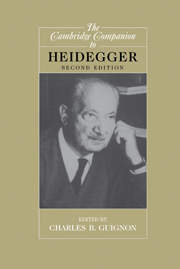Book contents
- Frontmatter
- Introduction
- 1 The question of being: Heidegger’s project
- 2 Reading a life: Heidegger and hard times
- 3 The principle of phenomenology
- 4 Time and phenomenology in Husserl and Heidegger
- 5 Laying the ground for metaphysics: Heidegger’s appropriation of Kant
- 6 Heidegger and the hermeneutic turn
- 7 Engaged agency and background in Heidegger
- 8 Death, time, history: Division II of Being and Time
- 9 Truth and the essence of truth in Heidegger’s thought
- 10 Authenticity, moral values, and psychotherapy
- 11 Heidegger, Buddhism, and deep ecology
- 12 Heidegger and theology
- 13 Heidegger on the connection between nihilism, art, technology, and politics
- 14 The fourfold
- Bibliography
- Index
- Series List
12 - Heidegger and theology
Published online by Cambridge University Press: 28 March 2007
- Frontmatter
- Introduction
- 1 The question of being: Heidegger’s project
- 2 Reading a life: Heidegger and hard times
- 3 The principle of phenomenology
- 4 Time and phenomenology in Husserl and Heidegger
- 5 Laying the ground for metaphysics: Heidegger’s appropriation of Kant
- 6 Heidegger and the hermeneutic turn
- 7 Engaged agency and background in Heidegger
- 8 Death, time, history: Division II of Being and Time
- 9 Truth and the essence of truth in Heidegger’s thought
- 10 Authenticity, moral values, and psychotherapy
- 11 Heidegger, Buddhism, and deep ecology
- 12 Heidegger and theology
- 13 Heidegger on the connection between nihilism, art, technology, and politics
- 14 The fourfold
- Bibliography
- Index
- Series List
Summary
Heidegger's thought was from the start deeply interwoven with religious and theological concerns. We have recently learned from the searching historical investigations of Hugo Ott the details of Heidegger's early upbringing and education in the Catholic church. Heidegger was born in the conservative, Catholic farmlands of southern, central Germany, and his father was a sexton in St. Martin's Church, which stood across a quaint little courtyard not fifty yards from the Heidegger house. The Heidegger family was steadfastly loyal to the church in the controversy that followed the First Vatican Council when “liberal” Catholics rejected the proclamation of papal infallibility. The youthful Heidegger, brilliant and pious, was marked from the start for the Catholic priesthood. Through a series of scholarships funded by the church, one of which was intended for students seeking to do doctoral work on Thomas Aquinas, the poor but gifted young man was lifted out of these rural farmlands into the eminence of a German university career. Hugo Ott has discovered that Heidegger's earliest publications appeared in 1910-12 in Der Akademiker, an ultraconservative Catholic journal that toed the line of Pope Pius X. There in a series of book reviews the youthful Heidegger, still in his early twenties, spoke out against the danger of “Modernism” to the ageless wisdom of the Catholic tradition. Heidegger cites with approval the saying of “the great [Josef von] Görres”: “Dig deeper and you will find yourself standing on Catholic ground.”
- Type
- Chapter
- Information
- The Cambridge Companion to Heidegger , pp. 326 - 344Publisher: Cambridge University PressPrint publication year: 2006
- 4
- Cited by



